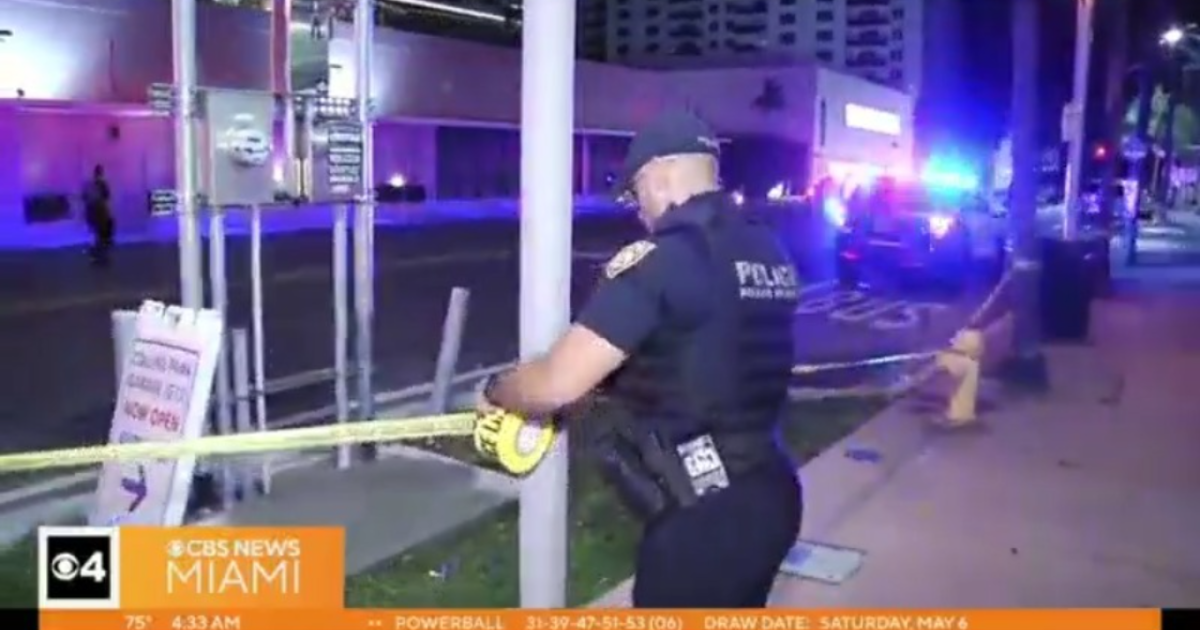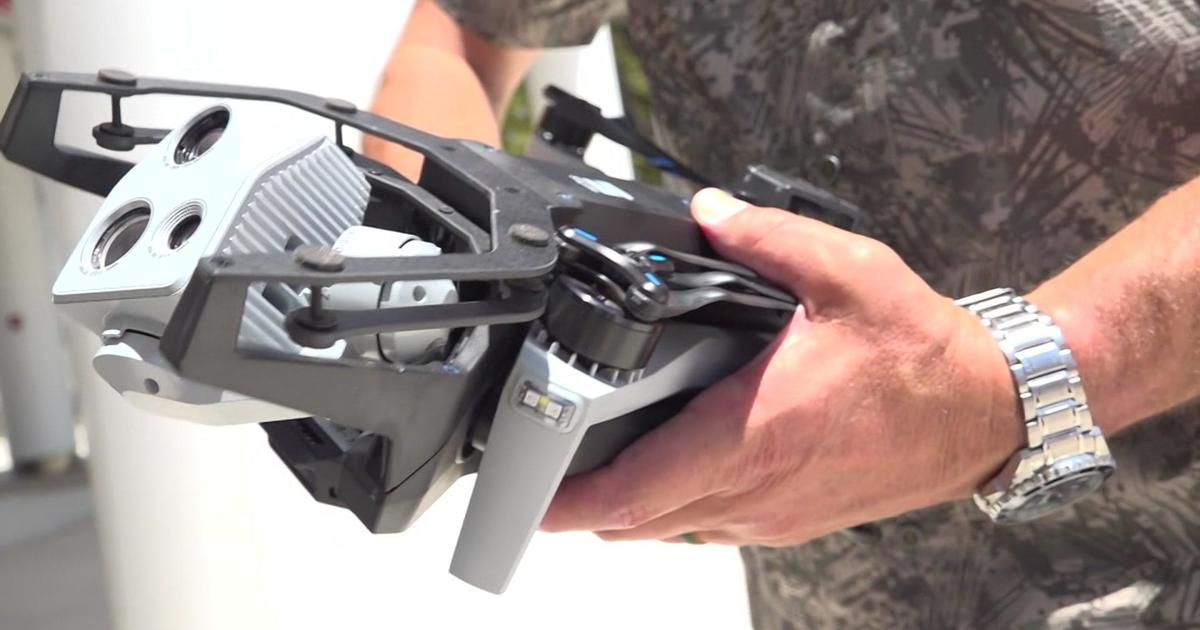US Co-opted Cuba's Hip-Hop Scene To Spark Change
Follow CBSMIAMI.COM: Facebook | Twitter
HAVANA (AP/CBSMiami) -- Amid tensions between Cuba and the United States, a U.S. contractor sent a Serbian music promoter to help spark an anti-government movement using rap music.
How did they do this?
They recruited one of Havana's most notorious rappers to spark a youth movement.
In communist Cuba, it was a project that could have landed Rajko Bozic in jail. So when he made his pitch to team up with hip-hop artist Aldo Rodriguez, Bozic left out the part about his true intentions — or that he was working for the U.S. Agency for International Development.
Dreadlocked, muscled and tattooed, Aldo, as he was known, was a hero in the hip-hop underground for lyrics protesting the Castro government's grip on everyday life in songs like "El Rap Es Guerra," or "Rap Is War," words he tattooed on his forearm.
CLICK HERE to watch CBS4's report
He and his group, Los Aldeanos, were about to unknowingly get sucked into a tug-of-war between Havana and Washington, as thousands of pages of documents obtained by The Associated Press and dozens of interviews show.
With Aldo's own government already harassing his group — his first album was titled "Censurado" — Bozic had been sent to turn up the volume of his protest songs.
USAID's secret Cuban hip-hop project sought to spread democracy, but like other U.S. operations on the island, it was executed by amateurs.
Documents show USAID repeatedly put innocent Cubans and its own operatives in jeopardy despite warning signs. Authorities detained or interrogated musicians or USAID operatives at least six times, often confiscating their computers and thumb drives, which in some cases contained material linking them to USAID.
Instead of sparking a democratic revolution, it compromised an authentic source of protest that had produced some of the hardest-hitting grassroots criticism since Fidel Castro took power in 1959, an AP investigation found.
In a written statement, USAID said the programs were part of a four-year contract that ended in 2012, but denied they were clandestine.
"Any assertions that our work is secret or covert are simply false," USAID said in a statement Wednesday. Its programs were aimed at strengthening civil society "often in places where civic engagement is suppressed and where people are harassed, arrested, subjected to physical harm or worse."
Creative Associates declined to comment.
The hip-hop operation ran simultaneously with two other USAID programs exposed by the AP earlier this year — the launch of a secret "Cuban Twitter" and a program that sent Latin American youth to provoke dissent — and also involved elaborate subterfuge, including a front organization and an exotic financial scheme to mask American involvement.
USAID targeted some of Cuba's most prominent musicians, including two icons close to the revolutionary government — Silvio Rodriguez and Pablo Milanes — and even members of the Castro family.
It all hinged on a strategy of subtle manipulation. Bozic, with his close-cropped black hair and wry smile, had been hired by Creative Associates International, a company with a multimillion-dollar contract from USAID. His goal: Commandeer the island's hip-hop scene "to help Cuban youth break the information blockade" and build "youth networks for social change," documents show.
Creative's contractors would recruit Aldo and scores of Cuban musicians for projects they disguised as cultural initiatives but really were aimed at boosting their visibility and stoking a movement of fans to challenge the government. The trick was to do that without getting arrested.
If it seems farfetched that the U.S. would use music to stir resistance against Raul Castro's government, there was a kind of precedent: Bozic's project was inspired by protest concerts by the student movement that had helped topple former Serbian President Slobodan Milosevic in 2000.
Bozic had surveyed Cuba's hip-hop scene and concluded that it offered a rare venue of dissent with potential for USAID's pro-democracy mission.
"Regularly, some of the artists are throwing angry rhymes heavily criticizing regime," he wrote after a trip in 2009. At one concert, while Aldo was at the microphone, someone had even yelled "Down with Fidel" to cheers from the audience.
The hip-hop project was a tough one to hide. Bozic operated in the glare of public stages in a country where music is inextricably intertwined with politics and daily life.
Already, the government was canceling performances and blocking hip-hoppers like Los Aldeanos from performing. It even had set up an agency to regulate hip-hop — Agencia Cubana de Rap.
"We shouldn't underestimate government's potential to recognize danger," Bozic told Creative in a memo.
Bozic noted that Cuban musicians were open to foreign support but wary of the U.S. Anyone caught participating in a USAID operation could be sent to prison. Funding was a matter "to be discussed only with highly confidential contacts," Bozic wrote.
So Bozic told Aldo that he worked in alternative media and marketing. The two talked in the third-floor apartment overlooking the Havana zoo that Aldo shared with his mom, but fled to a bar to avoid the rap star's incessantly ringing phone. It seemed everyone wanted something from Aldo.
Los Aldeanos' lyrics targeted a government that was trying to silence them by shutting down concerts or denying them visas to perform overseas. "This country is a prison," they rapped.
To the embattled hip-hoppers, Bozic's pitch to underwrite a TV project showcasing the work of young musicians sounded sincere. The music would be distributed through the Cuban underground on DVDs and thumb drives. It was an easy sell — and Aldo accepted, Bozic reported to Creative.
"Hip hop is the breath of fresh air in a place where you can't breathe," Aldo told the Serb.
NAUGHTY ARTISTS
Los Aldeanos packed the house in the town of Candelaria on June 5, 2009. Before a crowd of some 150 cheering fans, they rapped about censorship and being banned from performing publicly in Havana. Bozic and his crew filmed the gig.
The police showed up after the final song, looking for the musicians who had been saying "counterrevolutionary things." As the rappers argued with police, Bozic and his foreign team slipped away. Aldo and the crew's cameraman spent the night in jail for "disturbing the public," the Serb reported.
Los Aldeanos's militancy against the government in front of big crowds was virtually unheard of in Cuba.
"I'm tired of following their plan
Socialism or Death is not a slogan.
They're the only options you get."
For Bozic, tension with the authorities was part of the game. The hip-hop scene, he wrote, was "subversive enough to be extremely cool, but at the same time not too dangerous to play in it."
A little repression could work in their favor, he advised Creative: "Gathering to confront the censorship imposed on hip-hop has a great potential."
That was right out of the Serbian student playbook from 2000.
In an interview with the AP in Belgrade, Bojan Boskovic, who works with Bozic, said Serbian students' protest concerts started out as purely cultural but gradually added political messages. In the end, he said, "Basically every band that was playing was saying you know, 'We need to get rid of this government, you guys can do it, come on.'"
Boskovic declined comment on his Cuba work, but documents make clear that Creative took a long view. Cuba was nowhere near the political tipping point that had existed in Serbia; early in the Cuban program, a Creative manager spoke of being halfway through a decade-long effort.
So Creative saw an opportunity as large as the potential crowd when the major Latin rock star Juanes announced he would stage a Havana concert in September 2009.
Creative's managers convened a two-day session at their offices in San Jose, Costa Rica, to explore how to co-opt Juanes and others, including famed Cuban troubadours Silvio Rodriguez and Pablo Milanes. They thought connecting Aldo to international stars would lower chances the Cubans would jail him for counterrevolutionary lyrics.
The session was led by Xavier Utset, a veteran of anti-Castro efforts who ran the program for Creative Associates.
"What materials do we need to get to Juanes to 'sell' our idea?" his agenda read.
Creative used its nascent Cuban Twitter program to send hundreds of thousands of mysterious text messages asking Cubans whether Los Aldeanos should join Juanes on the concert bill. Even the rappers had no idea where the messages originated.
The Colombian superstar declined to bring them onstage, but agreed to meet them after the concert.
The day of the show, the group's manager invited them up to her room. It was the rappers' first time ever in a hotel, she said.
"They were having endless fun taking showers and ordering room service," Melisa Riviere recalled in an interview. Aldo was so struck by it he later recorded a song called "Hotel Nacional!!!"
When Juanes closed the show, he thanked Los Aldeanos — a move Creative hoped would help shield them from state pressure. Afterwards, he invited them to his hotel room, where Riviere snapped a picture of Juanes posing with Aldo, his rap-partner Bian Rodriguez, and their sometimes collaborator Silvito Rodriguez, son of the legendary Silvio Rodriguez.
It was a big moment: Los Aldeanos weren't some obscure local band anymore. They had the photo to prove it.
"It immediately gave Los Aldeanos an unprecedented prominence," Riviere said.
She didn't realize it at the time, but the photo also played right into Bozic's plan.
Though they'd met a few times, the Serb had gone to great lengths to hide his connections from everyone.
Creative was paying hundreds of thousands of dollars in salaries and to cover operational costs, including video and computer equipment.
To mask the money trail to the Serbians, Creative had set up a front company in Panama called Salida. It was headed by a lawyer in Liechtenstein. Bozic wasn't named, but he had power of attorney, according to a document that was intended to remain secret but was obtained by the AP.
"A BIG PROBLEM"
Despite his new fame, Aldo was arrested again the week after the September 2009 concert -- this time for illegally possessing a computer.
The Creative team learned the news from Adrian Monzon, a Cuban video jockey who was the "contact of highest confidence" on the island, documents show.
Monzon — who is noted in the hip-hop documents as the only Cuban national who knew what was going on and was paid by Creative — reported Aldo's arrest during a chat with his managers.
"YOU NEED TO CHANGE YOUR passwords/gchat names if they take your computer, that is a BIG PROBLEM," the manager wrote.
While the USAID contractors plotted how to spring Aldo from jail, they got another lucky break.
Silvio Rodriguez, the father of Aldo's musical collaborator, called a friend in Cuba's Culture Ministry, the older singer recalled in an interview with the AP in Havana. The troubadour asked for the computer to be returned, saying, "Look, if there's a problem, tell them I gave him the computer as a present."
That got Aldo out of jail, but documents show it took a while for police to return his computer. Creative worried that there might be emails on it that would raise suspicions about the youth TV project.
Even if Aldo didn't know what was going on, maybe the Cubans would figure it out.
Next, it was Bozic's turn in the hot seat. In November 2009, he was detained coming into Cuba carrying "all of Best Buy on his back" — computer and video equipment for performers and videographers — Bozic told a former USAID contractor, who recounted the conversation on condition of anonymity to avoid jeopardizing his work.
The police took the equipment, including a memory stick with documents "that had lots of info on them," a Creative manager wrote. Bozic cut his trip short. In a chat in early December, Creative told Monzon that the Serb would not be returning anytime soon.
Just weeks after Bozic left the country, Cuban authorities arrested U.S. citizen Alan Gross, another USAID contractor working on a separate secret program. He was sentenced to a 15-year prison term.
With Bozic gone, it was all up to Monzon, Creative's only contact on the island who understood the true mission.
Monzon got busy. He traveled around, scouting for more musical talent. Eventually, he identified about 200 "socially conscious youth" and connected them on a networking site he called TalentoCubano.org. Creative's managers hoped the "map," as they called it, would spark a "social movement."
By January 2010, though, Monzon could feel the heat: After a photographer working on the project was detained, Monzon got a visit from police.
"BB is awake," Monzon said in a chat, using the team's code for Cuban state security.
Officers took him for a not-so-optional visit to a Havana museum to talk. They were worried about the EXIT Festival, the annual summer music event that Bozic helped produce in Serbia, and suspicious of the TalentoCubano project, Monzon reported to the Serb. "The fact is that they are VERY concerned about you guys" and the possibility of a CIA plan "to destroy revolution."
Later that month, Monzon flew out with a group of young musicians from his TalentoCubano project for "leadership training" in Europe — a trip really aimed at cultivating activists. He promoted his website at a public event, labeled by one Creative document as "great cover story for the authorities on the island."
The unwitting young musicians spent a month in Amsterdam and Madrid on topics that included polling and guerrilla marketing, and were taught how to conduct graffiti campaigns that would highlight sensitive political issues.
Four months later, in July 2010, Los Aldeanos arrived in Serbia to perform at the EXIT Festival — their first trip ever out of Cuba — and were trained as well.
"Do you think the training worked to focus them a little more on their role as agents of social mobilization?" Utset asked in a chat with Monzon.
"Yes," Monzon wrote. "They see that there are other people in other places fighting the same fight and even in worse conditions."
He added, "The Serbs are always telling us if we did it in Serbia, FOR SURE, you can do it in Cuba."
A "MIND BLOWING" CONNECTION
The Creative team decided to infiltrate an arts and music festival put on by the family of music giant Pablo Milanes, the famed singer of "nueva trova" music.
The contractors paid $15,000 to underwrite it, so his TalentoCubano artists could be showcased. The real mission, though, was to seed "the minds of festival organizers with new ideas" and persuade them to send "high-impact messages" to the audience," read one report.
The effort was nearly derailed in August 2010, when Bozic wired the money from Europe. USAID's effort was so covert that it even surprised the U.S. Treasury Department, which froze the transaction under suspicion that it violated the U.S. embargo.
The Cuban government, however, was unravelling the scheme. Milanes' daughter, Suylen Milanes, said officials arrived the day before the festival and warned her that she was associating with unsavory characters. They even showed her copies of Bozic's emails, which they called suspicious, she recalled in an interview. Her father declined to comment.
Later, Creative set its sights on an even more audacious plan — persuading a Cuban agency to take part in the next EXIT festival in Serbia through a member of the Castro family.
Bozic had met a relative of Raul Castro's daughter, Mariela, director of the National Center for Sex Education.
In a chat with Creative, Bozic pitched partnering with her, which went over big. "Wow...that is mind blowing to me that we could possibly work with Raul's own family," a manager wrote.
Mariela Castro told the AP that her institute had sent two representatives to the festival but didn't get more involved because the festival "didn't have anything to do with the work we were doing."
VIVA CUBA LIBRE!
Back in Havana, Los Aldeanos were invited to perform at Rotilla, Cuba's annual electronic music festival in August.
The three-day festival had grown from a beach party near Havana in 1998 to billing itself as Cuba's largest independent music fest.
In August, Rotilla drew its biggest crowd ever — about 15,000 people. The Aldeanos didn't hold back, lacerating government officials with slang expletives and taunting the police, who were certainly watching.
"The police instead of making me hate them, inspire pity, because they are such sh--- eaters they don't even realize they are victims of the system. Viva Cuba libre," Aldo's partner rapped.
The crowd cheered.
For Creative, it was a triumph — but short-lived.
By 2011, government suspicion was making it hard to operate. But despite clear signs the Cubans were onto them, the team kept taking risks — and making the same mistakes.
Even in Miami, where they flew Monzon in for a meeting in April, they worried Cuban intelligence was watching. Utset said he would sneak into a rented office so he wouldn't be seen with his co-conspirators, documents show.
Predictably, Monzon was detained when he returned to Cuba. His computer and a memory stick were seized — and again, the conspirators didn't know if compromising data was on them.
Nevertheless, they pressed on, hatching a labyrinthine method to finance the TalentoCubano artists secretly.
Bozic wanted Creative to give money to a Croatian friend, who would "donate" it to a British friend's charity. That outfit would then send money to Monzon for the musicians — without informing the charity's board.
But Creative's luck was wearing out. The scheme fell apart, and soon, so did their hip-hop operation.
When Monzon got his confiscated equipment back, he noticed a contract he had overlooked that clearly linked him to both Creative and the Panamanian front company.
They were busted.
THE ORIGINAL SIN
In 2010, the Rotilla Festival had seemed like a triumph to build on. But before the next festival could take place, Cuban authorities informed organizers they were taking it over.
A Creative contractor warned that the Cubans knew Bozic and his partners "were receiving money from USAID" and trying to undermine the government as they did with Milosevic in 2000.
Rotilla had independent roots, but documents show Bozic and the EXIT festival had been backing it since 2006, a period during which it grew enormously.
In an interview Sunday in Havana, Rotilla founder Michel Matos said that while he was proud of his role in Rotilla, he was shocked to learn that the Serb was working for USAID and said he would never knowingly take American money from people with ulterior motives.
"If I get money from the American government to take cultural action, it's not that I just have a problem with the Cuban government," he said. "I have a problem with Cubans."
"This is like the original sin," he explained.
Silvio Rodriguez was similarly surprised.
"I never imagined that a program like this could exist," the troubadour said. "When you find out you could be surrounded by a conspiracy, it's shocking."
Rotilla had been exactly what the U.S. government sought to foster: an organic, cultural initiative independent of the government. Instead, USAID gave the Cuban officials a reason to end it.
Soon, Aldo found that making a living as a rapper in Cuba was impossible. The government intensified its censorship, he said in recent interviews, blocking Los Aldeanos from performing. Today, the Cuban hip-hop scene that peaked with Los Aldeanos has faded.
Aldo, now 31, moved to Tampa. He still performs, but his music has a softer edge.
He declined to discuss being targeted by the project. "My conscience is clear," he told the AP.
Adrian Monzon moved to Miami, where he now works at a Papa John's. Monzon declined to comment about his role.
Bozic, the Serb, went on to projects in Tunisia, Ukraine, Lebanon and Zimbabwe. He declined to comment on his Cuban operation.
Xavier Utset, the mastermind behind the "Cuban Twitter" and hip-hop projects, declined to comment. He has left Creative for a job with the U.S. government.
He works for USAID.
(TM and © Copyright 2014 CBS Radio Inc. and its relevant subsidiaries. CBS RADIO and EYE Logo TM and Copyright 2014 CBS Broadcasting Inc. Used under license. All Rights Reserved. This material may not be published, broadcast, rewritten, or redistributed. The Associated Press contributed to this report.)
RELATED CONTENT:



